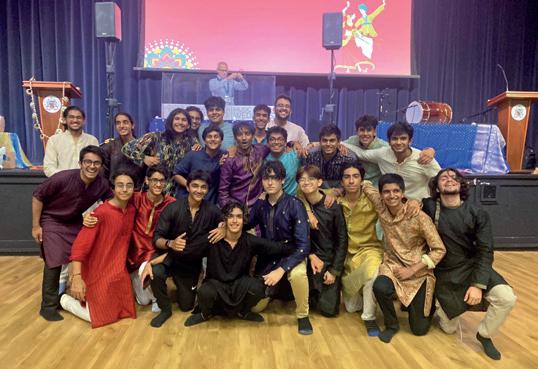
2 minute read
Navigating Global Issues
several statements and policies have directly targeted minority groups and EDIB policies. Key to our speakers’ roles is the need to respond to global events such as these, which may cause young people to feel upset or worried about the future. Monia told us: “When policies like this change so dramatically, it can feel really unsettling, especially if you’ve been working so hard to make schools and workplaces more inclusive, but I think the key thing - and the key driver for us here - has been that our efforts in DEI are bigger than a government policy or a movement.” David also echoed this, emphasising that events in the news, whilst distressing, do not prevent the crucial work taking place in these schools: “When the news changes so quickly, the conversation shifts, and it can detract from a genuine dialogue about the work that we’re doing, and how best to support the individuals within our communities.” Facilitating productive conversations with students is key to working through challenging times and remaining hopeful, Monia believes: “When it comes to young people in particular, I think it’s really important to help them understand that history moves in cycles and progress is often met with resistance.” Marvyn also hopes to inspire pupils to focus on the positive and not be held back by political frustration, he shared. Looking towards the future, all our guests remain hopeful, whilst acknowledging that there are undoubtedly challenges facing those working on EDIB education. At Cranleigh, collaboration with external organisations such as BAMEd (Black, Asian and Minority Ethnic Educators) and Black Lives in Music support the school to continue to make progress in becoming more diverse and
TURN TO PAGE 74 to read about Diverse University Courses inclusive and empowering all their students to thrive in a diverse and inclusive world. David explained: “Anything that promotes, discusses or supports schools with these issues is invaluable, because ultimately, these pupils are going out into the world and they need to have working knowledge of how to navigate it and how to lead on it.” At Haberdashers’ Boys’, pupils are prepared for the future by encouraging them to be “active bystanders”, prepared to stand up for their values and support one another. Monia explained: “That active bystander, that allyship, is so, so important. We move away from just protecting your own identity and towards being the biggest advocate for someone else’s identity and being vocal in support of someone else.” These community values and passions are also encouraged through Marvyn’s books I Love Me and The Best Me, which encourage children and adults alike to develop the confidence and self-esteem to remain resilient and thrive in the world. Marvyn also remains hopeful and determined for the future, concluding: “We are going to make space and accommodate as many people as humanly possible and we’re going to be listening to see how we accommodate them going forward.” www.habselstree.org.uk/boys/senior www.cranleigh.org www.dopeblack.org www.belovd.agency.com
We would like to thank our panel speakers for giving up their time to speak to us.
CLICK HERE to listen to our Education Corner Podcast with Mrs. Samantha Price, Head of Cranleigh School










